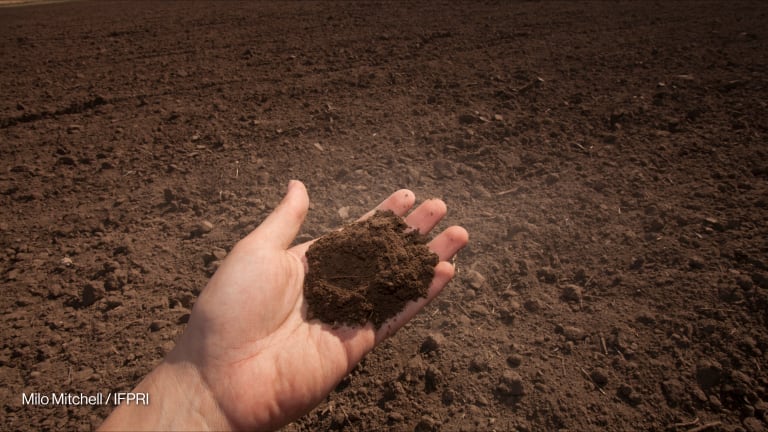Star pupil's performance casts doubt on green growth model
Morocco's efforts to grow green have attracted international attention and praise. But a closer look at the "green growth" proponents' star pupil suggests carbon emissions cannot be cut radically alongside efforts to improve the economy.
With the effects of climate chance becoming ever more widely and deeply felt around the globe, many climate scientists are warning that the planet is not able to support unlimited fossil fuel driven economic development without courting a climate catastrophe. Proponents of “green growth” counter that we can radically cut carbon emissions even as economic output continues to soar. Worryingly, a closer look at their star pupil suggests that the defenders of “green growth” might be wrong. Morocco’s efforts to grow green have attracted international attention and praise. In the latest Germanwatch climate change performance index, which rates countries’ climate policies, Morocco ranks first among all developing countries assessed; it is the only state outside Europe whose overall performance is rated as “good.” “Morocco is an excellent example of green growth,” said Benoit Blarel, manager of the Environment and Natural Resources global practice at the World Bank, addressing a conference in Rabat in April this year. “There is not necessarily a contradiction between economic growth and limiting climate change.” In few developing nations are the twin battles against poverty and ecological disaster being fought as fiercely as in Morocco. The kingdom in North Africa has racked up an impressive track record of leveraging economic growth to reduce poverty. At the same time, the country is exceptionally strongly threatened by global climate change. More than 80 percent of its agricultural land is located in arid or semi-arid zones, and a similar proportion is rain-fed. Over the past half-century, spring rains have already dropped by more than 40 percent, leading to intensified droughts: The 1994-95 drought alone wiped 7.6 percent off the country’s overall gross domestic product. The World Bank warns that far worse is to come, including temperature rises of up to 8 degrees Celsius and “severe drought conditions” that will force people to abandon broad swathes of the countryside and migrate north. While Morocco’s government is already making plans to adapt by shifting away from grains and toward more livestock and forestry in some regions, it is also making considerable efforts to curb carbon dioxide emissions at home. Notably, the kingdom, with donor support, is currently building $9 billion worth of solar power plants and several gigantic wind farms. Also speaking at the Rabat conference, Morocco’s environment minister Hakima El Haite proudly cited her country’s top position in the Germanwatch index, while noting that developing countries will have to reduce their carbon dioxide emissions 20 percent by 2050 to limit global warming to the already dangerously high 2 degrees Celsius international target. But Morocco nowhere close to target What the minister did not mention is that even Morocco, the developing world’s green growth star performer, is nowhere close to achieving that target. The kingdom’s ambitious national energy efficiency strategy projects that even if all saving measures it envisages are implemented — a big “if” — carbon dioxide emissions will keep rising from the current 55.5 metric tons to peak at 68.8 metric tons in 2029, driven by continued population and economic growth. Even in this best-case scenario, a 20 percent cut by 2050 seems far-fetched. The problem is global. While experts warned and politicians dithered, emission levels between 2000 and 2010 rose significantly, Abedellah Mokssit, the director of Morocco’s national meteorological office, pointed out. “We’re facing catastrophic risk,” he warned. The World Bank’s Blarel nevertheless remains optimistic. “The cost of doing nothing will be humongous,” he told Devex. “I’m amazed at how quickly countries’ attitudes are changing.” But leaving enough carbon in the ground to stave off disaster would mean leaving a large share of known hydrocarbon reserves in the ground, in the process writing off $20 trillion worth of assets already on the books. Could the global economy survive a $20 trillion asset crunch and still grow? “We’re starting work on this at the bank,” Blarel said, conceding that “this will have a huge impact all over.” Realistically, global warming could and would only be limited to 2.5 degrees Celsius, he guessed, adding, “I’m an optimist.” Alice Lépissier from the Center for Global Development is not prepared to jettison the 2 degrees Celsius target just yet. “It’s possible to have a prosperous world without ruining the climate, but only if we start acting immediately and put a global price on carbon,” the public policy expert insisted. She is working on SkyShares, a program that models carbon trading patterns. Recently, she ran it on a two-degree warming scenario. “I think this is politically feasible,” she concluded. “It’s less expensive than what rich country climate negotiators assume provided allowances can be traded globally.” Check out more insights and analysis for global development leaders like you, and sign up as an Executive Member to receive the information you need for your organization to thrive.
With the effects of climate chance becoming ever more widely and deeply felt around the globe, many climate scientists are warning that the planet is not able to support unlimited fossil fuel driven economic development without courting a climate catastrophe. Proponents of “green growth” counter that we can radically cut carbon emissions even as economic output continues to soar.
Worryingly, a closer look at their star pupil suggests that the defenders of “green growth” might be wrong.
Morocco’s efforts to grow green have attracted international attention and praise. In the latest Germanwatch climate change performance index, which rates countries’ climate policies, Morocco ranks first among all developing countries assessed; it is the only state outside Europe whose overall performance is rated as “good.”
This story is forDevex Promembers
Unlock this story now with a 15-day free trial of Devex Pro.
With a Devex Pro subscription you'll get access to deeper analysis and exclusive insights from our reporters and analysts.
Start my free trialRequest a group subscription Printing articles to share with others is a breach of our terms and conditions and copyright policy. Please use the sharing options on the left side of the article. Devex Pro members may share up to 10 articles per month using the Pro share tool ( ).
Till Bruckner is the founder of TranspariMED, an initiative that works to end evidence distortion in medicine, and manages advocacy for Transparify, an initiative promoting transparency and integrity in policy research. In his previous life, he worked in international development, occupying both field and research roles. Till is interested in the hidden power relationships that structure global politics and our everyday lives, and in finding new ways of using research and advocacy to make the world a better place. Till holds a Ph.D. in Politics from the University of Bristol, U.K.




